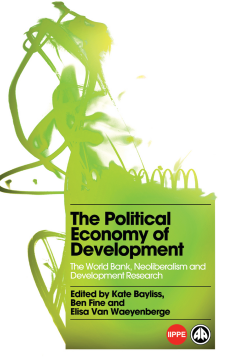
Additional Information
Book Details
Abstract
Any student, academic or practitioner wanting to succeed in development studies, radical or mainstream, must understand the World Bank's role and the evolution of its thinking and activities. The Political Economy of Development provides tools for gaining this understanding and applies them across a range of topics.
The research, practice and scholarship of development are always set against the backdrop of the World Bank, whose formidable presence shapes both development practice and thinking. This book brings together academics that specialise in different subject areas of development and reviews their findings in the context of the World Bank as knowledge bank, policy-maker and financial institution. The volume offers a compelling contribution to our understanding of development studies and of development itself.
The Political Economy of Development is an invaluable critical resource for students, policy-makers and activists in development studies.
'This powerful volume provides a highly effective critique of the 'knowledge' activities of the World Bank'
Ha-Joon Chang, University of Cambridge, author of Kicking Away the Ladder and Bad Samaritans
'Bayliss, Fine and Van Waeyenberge do a great service by putting together what I believe to be the first book, and certainly the most comprehensive, on this subject'
Dr Robin Broad, Professor at American University, Washington DC and co-author of Development Redefined: How the Market Met its Match
'Excellent… a profound, convincing critique of the World Bank approach to development research and policy'
Jayati Ghosh, Professor of Economics at Jawaharlal Nehru university, New Delhi, and the Executive Secretary of International Development Economics Associates (IDEA)
Table of Contents
| Section Title | Page | Action | Price |
|---|---|---|---|
| Cover | Cover | ||
| Contents | v | ||
| Acronyms and Abbreviations | vii | ||
| Preface | x | ||
| Part I: Preliminaries and Principles | 1 | ||
| 1. The World Bank, Neo-Liberalism and Development Research (Elisa Van Waeyenberge, Ben Fine and Kate Bayliss) | 3 | ||
| 2. A Knowledge Bank? (Elisa Van Waeyenberge and Ben Fine) | 26 | ||
| Part II: Research in Practice | 47 | ||
| 3. Understanding Aid at the Bank (Elisa Van Waeyenberge) | 49 | ||
| 4. A Cup Half Full: The World Bank’s Assessment of Water Privatisation (Kate Bayliss) | 73 | ||
| 5. Social Capital and Health (Ben Fine) | 99 | ||
| 6. World Bank Research on HIV/AIDS: Praise Where It's Due? (Deborah Johnston) | 128 | ||
| 7. Agriculture in the World Bank: Blighted Harvest Persists (Carlos Oya) | 146 | ||
| 8. A Policy Wrapped in ‘Analysis’: The World Bank’s Case for Foreign Banks (Paulo L. dos Santos) | 188 | ||
| 9. Hard Science or Waffly Crap? Evidence-Based Policy versus Policy-Based Evidence in the Field of Violent Conflict (Christopher Cramer and Jonathan Goodhand) | 215 | ||
| 10. The Washington Consensus and the China Anomaly (Dic Lo) | 239 | ||
| Part III: Continuity or Change? | 259 | ||
| 11. Whither World Bank Research? (Ben Fine, Elisa Van Waeyenberge and Kate Bayliss) | 263 | ||
| References | 285 | ||
| Index | 319 |
